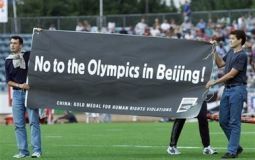China gathering intelligence on anti 2008 Olympics activists
July 23, 2007 (BEIJING) — China’s intelligence services are gearing up for next year’s Beijing Olympics, gathering information on foreigners who might mount protests and spoil the nation’s moment in the spotlight.
 Government spy agencies and think tanks are compiling lists of potentially troublesome foreign organizations, looking beyond the human rights groups long critical of Beijing, security experts and a consultant familiar with the effort said.
Government spy agencies and think tanks are compiling lists of potentially troublesome foreign organizations, looking beyond the human rights groups long critical of Beijing, security experts and a consultant familiar with the effort said.
They include evangelical Christians eager to end China’s religious restrictions, activists wanting Beijing to use its oil-buying leverage with Sudan to end the strife in Darfur, and environmental campaigners angry about global warming.
The effort is among the broadest intelligence-collection drives Beijing has taken against foreign activist groups, often known as non-governmental organizations, or NGOs. It aims to head off protests and other political acts during an Olympics the communist leadership hopes will boost its popularity at home and China’s image abroad.
“Demonstrations of all kinds are a concern, including anti-American demonstrations,” said the consultant, who works for Beijing’s Olympic organizers and asked not to be identified because he was not authorized to talk to the media.
The government, he said, was “trying to find out what kinds of NGOs will come. What are their plans?”
While foreign governments often monitor potentially disruptive groups ahead of big events, Beijing this time is ranging farther afield, targeting groups whose activities would be considered legal in most countries.
As such, the move carries risks for Beijing. Evidence that the communist government is withholding visas or engaged in heavy-handed policing to suppress protests would likely draw negative press and could unnerve the International Olympic Committee and corporate sponsors.
Scott Kronick, the president of Ogilvy Public Relations Worldwide’s China operations, said he raised concerns about the way protests might be handled when an official with the Beijing Olympic organizing committee asked him about the possibility of activists disrupting the torch relay.
“I said, ‘People will understand that. That’s the way different groups act. What you need to worry about is what your response is going to be and how you will act,'” said Kronick, whose clients include Adidas, an Olympic sponsor.
The Ministry of Public Security, the national police agency which runs some domestic spying networks, declined to comment as did the Beijing Olympic organizing committee. Phone numbers for the main spying agency, the Ministry of State Security, are not published, and the Cabinet’s main information office would not provide them.
Concerns about foreign protesters are a reminder of how the Beijing games differ from most previous Olympics. Aside from the hefty US$40 billion (A29 billion) price tag and the government’s outsized political ambitions, security poses a different challenge, complicated by Chinese leaders’ repressive policies at home and growing profile abroad.
“They are worried about a larger number of things and they are worried about keeping the lid on,” said Arnold Howitt, who runs crisis-management training programs for Beijing officials at Harvard University’s Kennedy School of Government.
Like all Olympic hosts since the Sept. 11, 2001 terrorist attacks, China’s security services are concerned about terrorism. Attacks by militant Islamic groups, some of them homegrown, top the list of scenarios the police and the military are preparing for, Chinese and foreign security experts said.
Yet China also faces a plethora of disaffected domestic groups _ Tibetans eager to cast off Chinese rule, farmers upset at land confiscations and Falun Gong, a once-popular spiritual movement the government suppressed as a cult. A research institute involved in crisis-planning for the Olympics has looked into possible unrest by unemployed workers, analysts at the think tank said.
China has long been wary of NGOs, fearing they might be acting as agents for foreign governments or encouraging defiance of the Communist Party.
Those worries grew in recent months as a multiplying number of foreign groups mounted public campaigns to tie causes as varied as promoting labor rights and protecting sharks to the Beijing games.
The Darfur campaigners, who threatened to re-brand the games the “Genocide Olympics” if China does not pressure Sudan to stop the conflict, particularly alarmed Beijing.
“As far as the Chinese side is concerned, NGOs are a destabilizing factor,” said the security consultant.
Though Chinese leaders believe a boycott is unlikely, successful protests by foreigners would not only tarnish the games but could also embolden domestic critics, Chinese foreign policy experts and activists said.
After four Americans unfurled a banner calling for Tibetan independence on the Chinese-controlled side of Mount Everest in April, China tightened access to Tibet for foreigners, especially Americans, Western diplomats in Beijing said.
In trying to neutralize foreign NGOs, Beijing is in part building on methods used to quash Falun Gong. After declaring the spiritual movement illegal in 1999, Beijing infiltrated the group and identified many among its millions of followers, both within China and overseas.
As with Falun Gong, the security consultant said government agencies were compiling lists of foreign NGOs and their members. He declined to specify whether electronic surveillance or infiltration, a textbook tactic for China’s police and spying agencies, were being used.
Part of the research into NGOs, including into Darfur groups, was being conducted by the China Institute of Contemporary International Relations, a think tank affiliated with the Ministry of State Security that also has an Olympic security task force, the two analysts said.
Officials in China’s overseas diplomatic missions are also being tasked to gather information on groups, the consultant said.
When The Associated Press reported in May on plans by U.S. and other Christian groups to proselytize at the Olympics, the press officer at China’s U.N. mission contacted the AP seeking more information.
“Africa, global warming, Darfur,” said the security consultant, “without the Olympic Games, Beijing would not be paying attention to these things.”
(AP)
